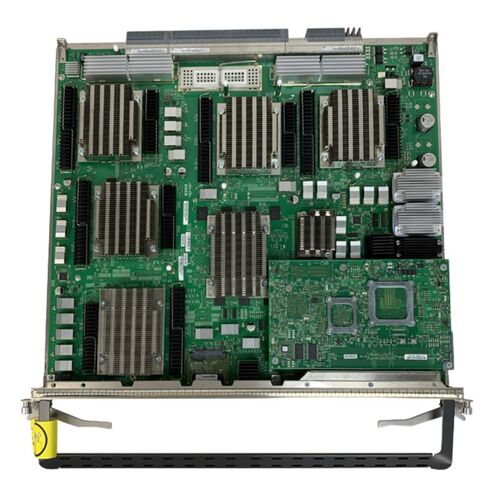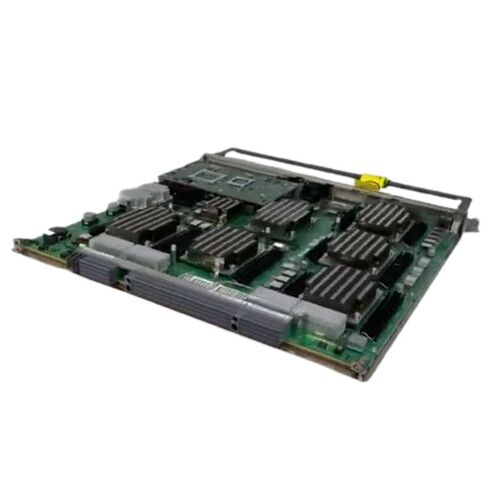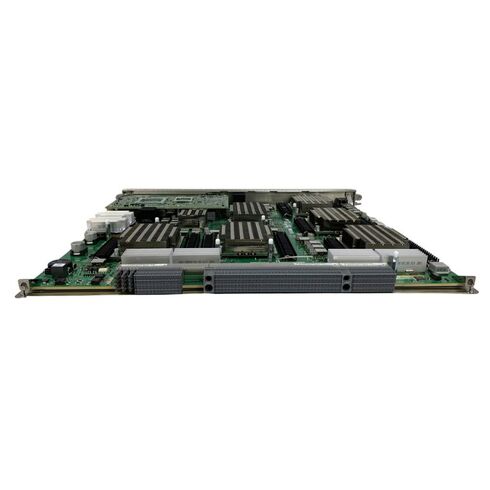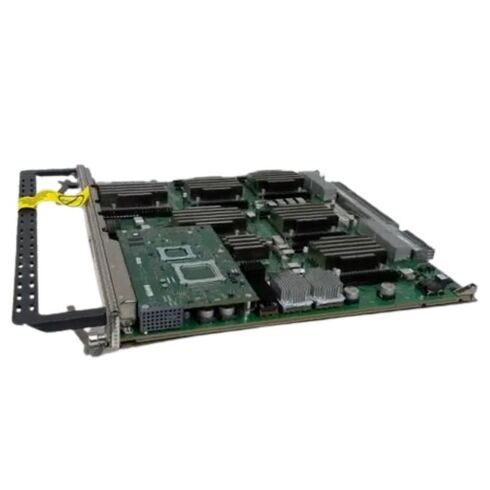CRS-DRP-B-CPU Cisco Distributed Route Processor
- — Free Ground Shipping
- — Min. 6-month Replacement Warranty
- — Genuine/Authentic Products
- — Easy Return and Exchange
- — Different Payment Methods
- — Best Price
- — We Guarantee Price Matching
- — Tax-Exempt Facilities
- — 24/7 Live Chat, Phone Support
- — Visa, MasterCard, Discover, and Amex
- — JCB, Diners Club, UnionPay
- — PayPal, ACH/Bank Transfer (11% Off)
- — Apple Pay, Amazon Pay, Google Pay
- — Buy Now, Pay Later - Affirm, Afterpay
- — GOV/EDU/Institutions PO's Accepted
- — Invoices
- — Deliver Anywhere
- — Express Delivery in the USA and Worldwide
- — Ship to -APO -FPO
- — For USA - Free Ground Shipping
- — Worldwide - from $30
CRS-DRP-B-CPU Cisco Distributed Route Processor Module
Product Overview
- Manufacturer: Cisco Systems, Inc.
- Part Number: CRS-DRP-B-CPU
- Type: Networking
- Sub-Type: Control Processor
- Product Name: CRS Distributed Route Processor CPU Module
Technical Specifications
Physical Attributes
- Enclosure Type: Plug-in module
- Dimensions: 1.8 in (W) x 18.6 in (D) x 20.6 in (H)
Processor and Memory
- Processor Installed: Dual PowerPC 1.2 GHz CPUs
- Installed RAM: 4 GB (maximum)
Network and Transport Protocols
- Supported Protocols: ICMP/IP, IPSec
- Routing Protocols: BGP-4, IS-IS, IGMPv2/v3, OSPFv2/v3, HSRP, VRRP, PIM-SM, PIM-SSM, MSDP, Multiprotocol BGP
- Remote Management: SNMP v1, v2c, v3, CLI
Advanced Features
- MPLS: Supports MPLS and MPLS Fast Reroute (FRR)
- IPv6 Support: Full support for IPv6
- Encryption Algorithms: MD5, SSL
- Authentication: Secure Shell (SSH2)
Compatibility and Compliance
Expansion and Connectivity
- Compatible Slots: Requires 1 expansion slot
Compliance Standards
- NEBS Level 3
- FCC Class A Certification
- Compliant with CISPR 22 Class A, EN 61000 series standards
- VCCI Class A ITE compliance
Environmental and Physical Characteristics
Dimensions and Form Factor
- Width: 1.8 inches
- Depth: 18.6 inches
- Height: 20.6 inches
Environmentally Friendly
- This product is designed with eco-friendly materials and standards in mind.
Compatibility
The Cisco CRS-DRP-B-CPU Distributed Route Processor is specifically designed for use with the Cisco CRS (Carrier Routing System) platform. It is compatible with various Cisco CRS models, providing users with a versatile and reliable solution for their network routing needs.
Benefits of Cisco CRS Compatibility
When it comes to network infrastructure, compatibility is crucial. By choosing a distributed route processor that is compatible with the Cisco CRS platform, users can enjoy several benefits:
1. Seamless Integration
With the Cisco CRS-DRP-B-CPU, users can seamlessly integrate the distributed route processor into their existing Cisco CRS network. This ensures smooth operations and minimal disruptions during the installation or upgrade process.
2. Scalability
The compatibility of the Cisco CRS-DRP-B-CPU with various Cisco CRS models allows for easy scalability. Users can easily expand their network capacity by adding or upgrading route processors without the need for significant changes to their existing infrastructure.
3. Enhanced Performance
Cisco CRS compatibility ensures optimized performance and maximum throughput. The distributed route processor works seamlessly with the Cisco CRS platform, leveraging its advanced features and capabilities to deliver high-speed routing and data processing.
The Importance of Cisco CRS Compatibility
Choosing a distributed route processor that is compatible with the Cisco CRS platform is of utmost importance for network administrators and operators. Here's why:
1. Future-Proof Investment
By selecting a distributed route processor that is designed for compatibility with the Cisco CRS platform, users are making a future-proof investment. They can rest assured that their infrastructure will be able to accommodate future advancements and upgrades within the Cisco CRS ecosystem.
2. Simplified Management
Having a compatible distributed route processor streamlines network management. Administrators can leverage familiar Cisco tools and interfaces to configure and monitor the device, reducing the learning curve and making network operations more efficient.
3. Access to Cisco Support
Compatibility with the Cisco CRS platform means users can benefit from Cisco's extensive support ecosystem. They can rely on Cisco's technical expertise, documentation, and community forums to troubleshoot any issues or seek guidance on optimizing their network performance.
Functionality
The Cisco CRS-DRP-B-CPU Distributed Route Processor offers advanced functionality for route processing within the Cisco CRS platform. It is designed to handle complex routing tasks efficiently, delivering reliable and high-performance network operations.
Benefits of Route Processing Functionality
The route processing functionality of the Cisco CRS-DRP-B-CPU provides users with numerous advantages:
1. Efficient Routing
The distributed route processor is equipped with powerful hardware and software capabilities to handle routing tasks efficiently. It can process large volumes of routing information, making it ideal for networks that require high-speed packet forwarding.
2. Enhanced Network Performance
By offloading routing tasks to a dedicated distributed route processor, network performance is significantly improved. The Cisco CRS-DRP-B-CPU ensures that routing decisions are made quickly and accurately, reducing latency and improving overall network responsiveness.
3. Redundancy and Resilience
The route processing functionality of the Cisco CRS-DRP-B-CPU supports redundancy and resilience in network operations. Multiple distributed route processors can be deployed in a redundant configuration to ensure uninterrupted service even in the event of hardware failures or network outages.
The Importance of Route Processing Functionality
Route processing functionality is crucial for network performance and reliability. Here's why the Cisco CRS-DRP-B-CPU's route processing functionality is important:
1. Efficient Resource Utilization
By offloading route processing tasks to a dedicated processor, network resources are efficiently utilized. This allows other components of the network infrastructure to focus on their respective functions, leading to improved overall performance and resource allocation.
2. Scalable Routing Capabilities
The route processing functionality of the Cisco CRS-DRP-B-CPU enables scalable routing capabilities. As network traffic increases, additional distributed route processors can be added to handle the load, ensuring that the network can accommodate growing demands without sacrificing performance.
3. Flexibility in Routing Policies
With a dedicated distributed route processor, network administrators have more flexibility in defining and implementing routing policies. They can fine-tune routing decisions based on specific requirements, optimizing network traffic flow and ensuring efficient utilization of available resources.
Processor Type
The Cisco CRS-DRP-B-CPU Distributed Route Processor is powered by a high-performance CPU (Central Processing Unit). The processor type plays a crucial role in determining the overall performance and capabilities of the distributed route processor.
Benefits of CPU
The CPU is a critical component in any computing device, including distributed route processors. The use of a high-performance CPU in the Cisco CRS-DRP-B-CPU offers several benefits:
1. Processing Power
A high-performance CPU ensures that the distributed route processor can handle complex routing tasks efficiently. It provides the necessary processing power to handle large volumes of routing information and make routing decisions quickly, contributing to improved network performance.
2. Multitasking Capabilities
The CPU's multitasking capabilities allow the distributed route processor to handle multiple tasks simultaneously. This is particularly important in network environments where routing decisions need to be made in real-time, while also performing other functions such as packet inspection or security checks.
3. Future-Proofing
A high-performance CPU ensures that the distributed route processor is capable of handling future advancements in network technologies and protocols. It provides the necessary processing power to accommodate evolving network requirements, making it a future-proof investment for users.
Architecture
The Cisco CRS-DRP-B-CPU Distributed Route Processor is based on a distributed architecture. This architecture plays a crucial role in the overall performance and scalability of the route processor within the Cisco CRS platform.
Benefits of Distributed Architecture
The distributed architecture of the Cisco CRS-DRP-B-CPU offers several benefits for network operators:
1. Scalability
A distributed architecture allows for easy scalability. Additional distributed route processors can be added to the network as traffic demands increase, ensuring that the network can handle growing traffic volumes without compromising performance or reliability.
2. Redundancy and High Availability
Distributed architecture provides redundancy and high availability in network operations. Multiple distributed route processors can be deployed in parallel, ensuring that critical routing functions are not affected by hardware failures or outages.
3. Load Balancing
Distributed architecture enables load balancing across multiple distributed route processors. This ensures that routing tasks are evenly distributed, preventing any single component from becoming a performance bottleneck and optimizing overall network performance.
Product Name
The Cisco CRS Distributed Route Processor is a powerful and versatile solution designed to enhance the routing capabilities of the Cisco CRS platform. It offers a range of features and benefits that make it an essential component for network operators.
Benefits of Cisco CRS Distributed Route Processor
The Cisco CRS Distributed Route Processor provides users with numerous advantages:
1. Enhanced Routing Performance
The distributed route processor significantly enhances routing performance within the Cisco CRS platform. It leverages advanced hardware and software capabilities to ensure efficient routing decisions, leading to improved network performance and responsiveness.
2. Scalability and Flexibility
The Cisco CRS Distributed Route Processor offers scalability and flexibility in network operations. It can be easily upgraded or expanded to accommodate growing traffic demands, providing users with the flexibility to adapt their network infrastructure as needed.
3. Redundancy and High Availability
With support for redundant configurations, the Cisco CRS Distributed Route Processor ensures high availability and resilience in network operations. It minimizes the risk of service disruptions by providing backup route processing capabilities in case of hardware failures or outages.
Conclusion
The Cisco CRS-DRP-B-CPU Distributed Route Processor is a highly compatible, functional, and powerful solution for enhancing routing capabilities within the Cisco CRS platform. It offers compatibility with various Cisco CRS models, advanced route processing functionality, high-performance CPU, distributed architecture, and numerous benefits for users. By choosing the Cisco CRS-DRP-B-CPU, users can ensure seamless integration, scalability, enhanced performance, efficient resource utilization, simplified management, access to Cisco support, future-proof investment, and optimized network operations.











